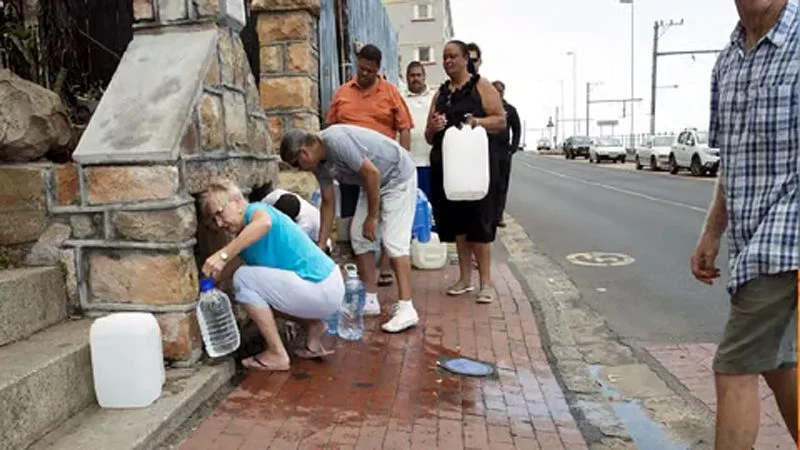or the past two weeks, Tsholofelo Moloi has joined countless South Africans waiting in line for water as Johannesburg, the country’s largest city, grapples with an unprecedented collapse of its water system that impacts millions.
This shortage, unprecedented in severity, has affected residents across the socioeconomic spectrum. While the current heatwave has depleted reservoirs, the city’s deteriorating infrastructure—resulting from years of neglect—plays a significant role in the crisis. The public’s growing frustration poses a significant challenge for the ruling African National Congress (ANC), which has maintained its grip on power since the end of apartheid in the 1990s but faces serious electoral challenges this year.
Amid ongoing electricity shortages, South Africans have begun to use the term “watershedding,” mirroring the concept of “load shedding” that refers to planned power cuts.
Moloi, who lives in Soweto on Johannesburg’s outskirts, expressed concern over the dire situation. Residents like her are forced to queue daily for water delivered by municipal tanker trucks. Before the trucks arrived recently, a desperate Moloi had to rely on a nearby restaurant for water, as buying a five-liter bottle at 25 rand ($1.30) is too costly for many in a country where over 32% of the population is unemployed.
“We are really struggling,” Moloi said. “We need water for cooking, for the kids’ school needs, and to wash their clothes. It’s incredibly stressful.”
While residents of Johannesburg and its surrounding areas are accustomed to occasional water shortages, they have never experienced such widespread issues all at once. Water management authorities in Gauteng, which encompasses Johannesburg and Pretoria, recently warned city officials that if water consumption isn’t curtailed, the entire system could collapse, with reservoirs dropping below 10% capacity and needing to be shut down for replenishment.
This could lead to weeks without running water at a time when demand is soaring due to the hot weather, with winter still weeks away.
No official drought has been declared, but officials are urging residents to conserve water wherever possible. With World Water Day approaching, the need for water conservation is more pressing than ever.
Activists and residents are labeling this a crisis years in the making, attributing it to poor management and a lack of maintenance on aging infrastructure that dates back to the post-apartheid era when services were expanded for the country’s Black population. While the ANC once thrived on the optimism of that period, many South Africans are now questioning how the management of essential services went so wrong.
A report from the national Department of Water and Sanitation last year revealed that 40% of Johannesburg’s water supply is wasted due to leaks, including burst pipes.
Even residents in the city’s wealthier neighborhoods, often equipped with swimming pools, have found themselves dependent on municipal water tankers, surprising many. In Blairgowrie, a local community protested after enduring nearly two weeks without water.
Lefa Molise, a local councilor in Soweto, expressed skepticism about the prospects for a swift resolution to the water shortage. With frequent water cuts, he has urged residents to save any water they can find, noting that authorities often provide little to no notice before shortages occur.
The municipal tankers alone cannot meet the residents’ needs, he added.
Thabisile Mchunu, a local resident, shared her frustration, explaining that her taps have been dry for over a week. She now carries water in 20-liter buckets from wherever she can find it. “The sad thing is that we don’t know when our taps are going to run with water again,” she lamented.
Rand Water, the government entity responsible for supplying water to multiple municipalities in Gauteng, recently urged residents to cut back on their consumption. The reservoirs that feed the system are currently at just 30% capacity, and high demand on any one reservoir affects the others.
Even the notoriously unreliable electricity system in South Africa has contributed to the water crisis. On Tuesday, Johannesburg Mayor Kabelo Gwamanda reported that a lightning strike had caused a failure at a power station supplying electricity to one of the city’s major water pumping facilities.























